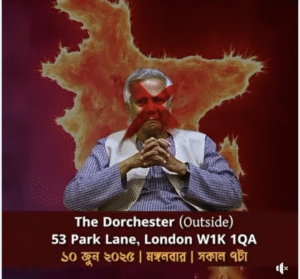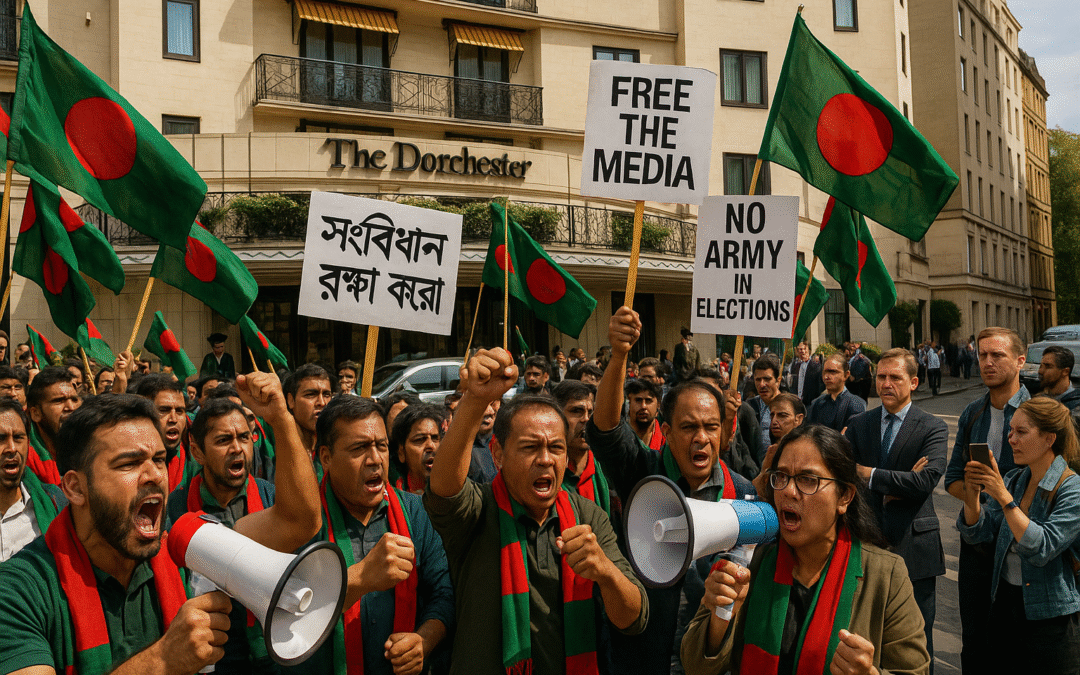In a dramatic show of resistance, members of the Bangladeshi diaspora recently staged high-energy protests in London against the visit of the Chief Advisor of Bangladesh’s Interim Government. The scenes—unfolding outside the Dorchester Hotel, House of Commons, and Chatham House—were anything but ordinary. They featured an eclectic crowd of political exiles, opposition activists, secular campaigners, student leaders, and civil society voices, all raising slogans in unison.
Their grievances? Allegations of illegitimacy, fears of an army-backed technocratic regime, and a collective frustration with the state of political affairs in Bangladesh.
Their goal? To send a message loud enough to echo from Hyde Park to Dhaka.
But did they succeed?
Let’s take a closer look.
A Protest of Many Faces
The protest videos circulating on social media showcase a diverse but fragmented diaspora—some shouting “No to fascism!” in Bengali, others holding placards in English calling for electoral reform and media freedom. The event had all the hallmarks of passion, pain, and political urgency.
Yet, it also bore signs of unfiltered chaos.
https://www.facebook.com/share/v/16UbdVdEyy/
There was no single leadership, no disciplined choreography, and no unified message. Just a rising crescendo of anger—amplified through loudspeakers and megaphones.
While the protest was rooted in legitimate political dissent, it lacked the polish and strategic nuance required for international persuasion.
Democratic Right or Disorderly Display?
Let’s be clear: protest is a sacred democratic right. And when your homeland descends into what many believe is authoritarian overreach or elite manipulation, it’s only natural for its expatriates to speak out.
https://www.facebook.com/share/v/1EbS5VsVki/
That said, shouting over traffic in central London, brandishing posters without a clear context for onlookers, and projecting pseudo-aggressive behaviour—all risk being counterproductive.
Passion without strategy becomes noise. Noise without messaging becomes a nuisance.
The protestors had every right to challenge the chief advisor’s legitimacy. But how they exercised that right matters just as much, especially in a city like London, where civic space is both revered and heavily scrutinised.
Through the Eyes of a London Passerby

Imagine you’re a Londoner or a tourist strolling through Mayfair or the Westminster district. You see crowds of angry individuals shouting slogans in a language you don’t understand. There are flags, loudspeakers, heated exchanges, and a palpable intensity in the air.
Do you
-
Stop to learn more?
-
Feel threatened?
-
Walk away thinking this is just another imported ethnic row?
Chances are, it’s the latter.
Instead of sparking curiosity or empathy, the high-decibel protest likely alienated more people than it engaged. The message was potent, but the delivery was alienating. For many, it may have seemed like just another foreign political crisis unfolding in British streets.
Global Optics: What Did the World See?
The irony is cruel. While the protestors intended to expose authoritarianism, they may have inadvertently projected an image of instability and incoherence.
From an international observer’s perspective:
-
Bangladesh appeared divided even on foreign soil.
-
The interim government’s critics looked angry but not necessarily organised.
-
The diaspora—a powerful engine for change—appeared to be reacting emotionally rather than leading diplomatically.
This is a tragic misstep. Especially in front of Chatham House, a symbol of global diplomacy and sober policy dialogue.
A Call for Strategic Resistance
The protests may have been emotionally cathartic, but real political change requires more than raised voices. It demands:
-
Clear messaging in English, accessible to international media and policymakers.
-
Unified leadership among diaspora political factions.
-
Peaceful symbolism—such as silent vigils, leaflet distribution, or art-based protest — to engage broader public opinion.
-
Targeted lobbying within British political circles to build pressure through formal channels.
The Bangladeshi diaspora has the education, influence, and reach to do this — but it must rise above imported theatrics.
Final Reflections
The Dorchester protest should serve as a wake-up call—not just to the Bangladeshi interim leadership, but to the diaspora itself.
If we want the world to take Bangladesh seriously, we must first learn to protest with dignity, discipline, and a strategic approach. Otherwise, we risk becoming a caricature of the chaos we claim to be fighting against.
London is not just a stage—it’s a mirror. And the image we cast in that mirror will echo far beyond Marble Arch.
📍 Author’s Note: These views are part of an independent civic analysis. All parties are encouraged to reflect and engage in productive dialogue for a democratic future in Bangladesh.
Would you like a shortened version of this for Facebook or newspaper column publishing?






